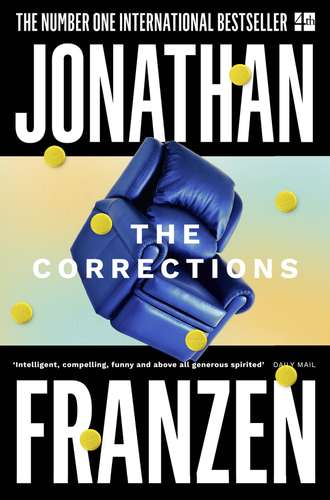
Полная версия
The Corrections
The price on the beautiful paper-wrapped filet that he was handed was $78.40. Luckily, this discovery knocked the wind out of him, otherwise he might have lodged a protest before realizing, as he did now, that the prices at the Nightmare were per quarter pound. Two years ago, two months ago, he would not have made a mistake like this.
“Ha, ha!” he said, palming the seventy-eight-dollar filet like a catcher’s mitt. He dropped to one knee and touched his bootlaces and took the salmon right up inside his leather jacket and underneath his sweater and tucked the sweater into his pants and stood up again.
“Daddy, I want swordfish,” a little voice behind him said.
Chip took two steps, and the salmon, which was quite heavy, escaped from his sweater and covered his groin, for one unstable moment, like a codpiece.
“Daddy! Swordfish!”
Chip put his hand to his crotch. The dangling filet felt like a cool, loaded diaper. He repositioned it against his abs and tucked in the sweater more securely, zipped his jacket to the neck, and strode purposefully toward the whatever. Toward the dairy wall. Here he found a selection of French crèmes fraîches at prices implying transport via SST. The less unaffordable domestic crème fraîche was blocked by a man in a Yankees cap who was shouting into his cell phone while a child, apparently his, peeled back the foil tops of half-liters of French yogurt. She’d peeled back five or six already. Chip leaned to reach behind the man, but his fish belly sagged. “Excuse me,” he said.
Like a sleepwalker the man on the phone shuffled aside. “I said fuck him. Fuck him! Fuck that asshole! We never closed. There’s no ink on the line. I’ll take that asshole down another thirty, you watch me. Honey, don’t tear those, if we tear those we have to pay for them. I said it is a fucking buyer’s ball as of yesterday. We close on nuffin till this thing bottoms out. Nuffin! Nuffin! Nuffin! Nuffin!”
Chip was approaching the checkout lanes with four plausible items in his basket when he caught sight of a head of hair so new-penny bright it could only belong to Eden Procuro. Who was, herself, slim and thirty-six and hectic. Eden’s little son, Anthony, was seated on the upper level of a shopping cart with his back to a four-figure avalanche of shellfish, cheeses, meats, and caviars. Eden was leaning over Anthony and letting him pull on the taupe lapels of her Italian suit and suck on her blouse while, behind his back, she turned the pages of a script that Chip could only pray was not his own. The line-caught Norwegian salmon was soaking through its wrapping, his body heat melting the fats that had given the filet a degree of rigidity. He wanted to escape the Nightmare, but he wasn’t prepared to discuss “The Academy Purple” under the current circumstances. He veered down a frosty aisle where the gelati came in plain white cartons with small black lettering. A man in a suit was crouching beside a little girl with hair like copper in sunshine. The girl was Eden’s daughter, April. The man was Eden’s husband, Doug O’Brien.
“Chip Lambert, what’s happening?” Doug said.
There seemed to be no ways but girly ways for Chip to hold his grocery basket while he shook Doug’s square hand.
“April’s picking out her treat for after dinner,” Doug said.
“Three treats,” April said.
“Her three treats, right.”
“What’s that one?” April said, pointing.
“That is a grenadine-nasturtium sorbetto, sugar bunny.”
“Do I like it?”
“That I can’t tell you.”
Doug, who was younger and shorter than Chip, so persistently claimed to be in awe of Chip’s intellect and so consistently tested free of any irony or condescension that Chip had finally accepted that Doug really did admire him. This admiration was more grueling than belittlement.
“Eden tells me you finished the script,” Doug said, restacking some gelati that April had upset. “Man, I am psyched. This project sounds phenomenal.”
April was cradling three rimed cartons against her corduroy jumper.
“What kind did you get?” Chip asked her.
April shrugged extremely, a beginner’s shrug.
“Sugar bunny, run those up to Mommy. I’m going to talk to Chip.”
As April ran back up the aisle Chip wondered what it would be like to father a child, to always be needed instead of always needing.
“Something I wanted to ask you,” Doug said. “Do you have a second? Say somebody offered you a new personality: would you take it? Say somebody said to you, I will permanently rewire your mental hardware in whatever way you want. Would you pay to have that done?”
The salmon paper was sweat-bonded to Chip’s skin and tearing open at the bottom. This was not the ideal time to be providing Doug with the intellectual companionship he seemed to crave, but Chip wanted Doug to keep thinking highly of him and encourage Eden to buy his script. He asked why Doug asked.
“A lot of crazy stuff crosses my desk,” Doug said. “Especially now with all the money coming home from overseas. All the dot-com issues, of course. We’re still trying our very hardest to persuade the average American to happily engineer his own financial ruin. But the biotech is fascinating. I’ve been reading whole prospectuses about genetically altered squash. Apparently people in this country are eating a lot more squash than I was aware of, and squashes are prone to more diseases than you’d infer from their robust exterior. Either that or … Southern Cucumtech is seriously overvalued at thirty-five a share. Whatever. But Chip, this brain thing, man, it caught my eye. Bizarre fact number one is that I’m allowed to talk about it. It’s all public knowledge. Is this bizarre?”
Chip was trying to keep his eyes focused on Doug in an interested manner, but his eyes were like children, they wanted to skip up and down the aisles. He was ready, basically, to jump out of his skin. “Yeah. Bizarre.”
“The idea,” Doug said, “is your basic gut cerebral rehab. Leave the shell and roof, replace the walls and plumbing. Design away that useless dining nook. Put a modern circuit breaker in.”
“Uh huh.”
“You get to keep your handsome façade,” Doug said. “You still look serious and intellectual, a little Nordic, on the outside. Sober, bookish. But inside you’re more livable. A big family room with an entertainment console. A kitchen that’s roomier and handier. You’ve got your In-Sink-Erator, your convection oven. An ice-cube dispenser on the refrigerator door.”
“Do I still recognize myself?”
“Do you want to? Everybody else still will—at least, the outside of you.”
The big glowing tally for TODAY’S GROSS RECEIPTS paused for a moment at $444,447.41 and then went higher.
“My furnishings are my personality,” Chip said.
“Say it’s a gradual rehab. Say the workmen are very tidy. The brain’s cleaned up every night when you get home from work, and nobody can bother you on the weekend, per local ordinance and the usual covenantal restrictions. The whole thing happens in stages—you grow into it. Or it grows into you, so to speak. Nobody’s making you buy new furniture.”
“You’re asking hypothetically.”
Doug raised a finger. “The only thing is there might be some metal involved. It’s possible you’d set off alarms at the airport. I’m imagining you might get some unwanted talk radio, too, on certain frequencies. Gatorade and other high-electrolyte drinks might be a problem. But what do you say?”
“You’re joking, right?”
“Check out the Web site. I’ll give you the address. ‘The implications are disturbing, but there’s no stopping this powerful new technology.’ That could be the motto for our age, don’t you think?”
That a salmon filet was now spreading down into Chip’s underpants like a wide, warm slug did seem to have everything to do with his brain and with a number of poor decisions that this brain had made. Rationally Chip knew that Doug would let him go soon and that eventually he might even escape the Nightmare of Consumption and find a restaurant bathroom where he could take the filet out and regain his full critical faculties—that there would come a moment when he was no longer standing amid pricey gelati with lukewarm fish in his pants, and that this future moment would be a moment of extraordinary relief—but for now he still inhabited an earlier, much less pleasant moment from the vantage point of which a new brain looked like just the ticket.
“The desserts were a foot tall!” Enid said, her instincts having told her that Denise didn’t care about pyramids of shrimp. “It was elegant elegant. Have you ever seen anything like that?”
“I’m sure it was very nice,” Denise said.
“The Dribletts really do things super-deluxe. I’d never seen a dessert that tall. Have you?”
The subtle signs that Denise was exercising patience—the slightly deeper breaths she took, the soundless way she set her fork down on her plate and took a sip of wine and set the glass back down—were more hurtful to Enid than a violent explosion.
“I’ve seen tall desserts,” Denise said.
“Are they tremendously difficult to make?”
Denise folded her hands in her lap and exhaled slowly. “It sounds like a great party. I’m glad you had fun.”
Enid had, true enough, had fun at Dean and Trish’s party, and she’d wished that Denise had been there to see for herself how elegant it was. At the same time, she was afraid that Denise would not have found the party elegant at all, that Denise would have picked apart its specialness until there was nothing left but ordinariness. Her daughter’s taste was a dark spot in Enid’s vision, a hole in her experience through which her own pleasures were forever threatening to leak and dissipate.
“I guess there’s no accounting for tastes,” she said.
“That’s true,” Denise said. “Although some tastes are better than others.”
Alfred had bent low over his plate to ensure that any salmon or haricots verts that fell from his fork would land on china. But he was listening. He said, “Enough.”
“That’s what everybody thinks,” Enid said. “Everybody thinks their taste is the best.”
“But most people are wrong,” Denise said.
“Everybody’s entitled to their own taste,” Enid said. “Everybody gets one vote in this country.”
“Unfortunately!”
“Enough,” Alfred said to Denise. “You’ll never win.”
“You sound like a snob,” Enid said.
“Mother, you’re always telling me how much you like a good home-cooked meal. Well, that’s what I like, too. I think there’s a kind of Disney vulgarity in a foot-tall dessert. You are a better cook than—”
“Oh, no. No.” Enid shook her head. “I’m a nothing cook.”
“That’s not true at all! Where do you think I—”
“Not from me,” Enid interrupted. “I don’t know where my children got their talents. But not from me. I’m a nothing as a cook. A big nothing.” (How strangely good it felt to say this! It was like putting scalding water on a poison-ivy rash.)
Denise straightened her back and raised her glass. Enid, who all her life had been helpless not to observe the goings-on on other people’s plates, had watched Denise take a three-bite portion of salmon, a small helping of salad, and a crust of bread. The size of each was a reproach to the size of each of Enid’s. Now Denise’s plate was empty and she hadn’t taken seconds of anything.
“Is that all you’re going to eat?” Enid said.
“Yes. That was my lunch.”
“You’ve lost weight.”
“In fact not.”
“Well, don’t lose any more,” Enid said with the skimpy laugh with which she tried to hide large feelings.
Alfred was guiding a forkful of salmon and sorrel sauce to his mouth. The food dropped off his fork and broke into violently shaped pieces.
“I think Chip did a good job with this,” Enid said. “Don’t you think? The salmon is very tender and good.”
“Chip has always been a good cook,” Denise said.
“Al, are you enjoying this? Al?”
Alfred’s grip on his fork had slackened. There was a sag in his lower lip, a sullen suspicion in his eyes.
“Are you enjoying the lunch?” Enid said.
He took his left hand in his right and squeezed it. The mated hands continued their oscillation together while he stared at the sunflowers in the middle of the table. He seemed to swallow the sour set of his mouth, to choke back the paranoia.
“Chip made all this?” he said.
“Yes.”
He shook his head as though Chip’s having cooked, Chip’s absence now, overwhelmed him. “I am increasingly bothered by my affliction,” he said.
“What you have is very mild,” Enid said. “We just need to get the medication adjusted.”
He shook his head. “Hedgpeth said it’s unpredictable.”
“The important thing is to keep doing things,” Enid said, “to keep active, to always just go.”
“No. You were not listening. Hedgpeth was very careful not to promise anything.”
“According to what I read—”
“I don’t give a damn what your magazine article said. I am not well, and Hedgpeth admitted as much.”
Denise set her wine down with a stiff, fully extended arm.
“So what do you think about Chip’s new job?” Enid asked her brightly.
“His—?”
“Well, at the Wall Street Journal.”
Denise studied the tabletop. “I have no opinion about it.”
“It’s exciting, don’t you think?”
“I have no opinion about it.”
“Do you think he works there full-time?”
“No.”
“I don’t understand what kind of job it is.”
“Mother, I know nothing about it.”
“Is he still doing law?”
“You mean proofreading? Yes.”
“So he’s still at the firm.”
“He’s not a lawyer, Mother.”
“I know he’s not a lawyer.”
“Well, when you say, ‘doing law,’ or ‘at the firm’—is that what you tell your friends?”
“I say he works at a law firm. That’s all I say. A New York City law firm. And it’s the truth. He does work there.”
“It’s misleading and you know it,” Alfred said.
“I guess I should just never say anything.”
“Just say things that are true,” Denise said.
“Well, I think he should be in law,” Enid said. “I think the law would be perfect for Chip. He needs the stability of a profession. He needs structure in his life. Dad always thought he’d make an excellent lawyer. I used to think doctor, because he was interested in science, but Dad always saw him as a lawyer. Didn’t you, Al? Didn’t you think Chip could be an excellent lawyer? He’s so quick with words.”
“Enid, it’s too late.”
“I thought maybe working for the firm he’d get interested and go back to school.”
“Far too late.”
“The thing is, Denise, there are so many things you can do with law. You can be a company president. You can be a judge! You can teach. You can be a journalist. There are so many directions Chip could go in.”
“Chip will do what he wants to do,” Alfred said. “I’ve never understood it, but he is not going to change now.”
He marched two blocks in the rain before he found a dial tone. At the first twin phone bank he came to, one instrument was castrated, with colored tassels at the end of its cord, and all that remained of the other was four bolt holes. The phone at the next intersection had chewing gum in its coin slot, and the line of its companion was completely dead. The standard way for a man in Chip’s position to vent his rage was to smash the handset on the box and leave the plastic shards in the gutter, but Chip was in too much of a hurry for this. At the corner of Fifth Avenue, he tried a phone that had a dial tone but did not respond when he touched the keypad and did not return his quarter when he hung up nicely or when he picked the handset up and slammed it down. The other phone had a dial tone and took his money, but a Baby Bell voice claimed not to understand what he’d dialed and did not return the money. He tried a second time and lost his last quarter.
He smiled at the SUVs crawling by in ready-to-brake bad-weather automotive postures. The doormen in this neighborhood hosed the sidewalks twice a day, and sanitation trucks with brushes like the mustaches of city cops scoured the streets three times a week, but in New York City you never had to go far to find filth and rage. A nearby street sign seemed to read Filth Avenue. Things cellular were killing public phones. But unlike Denise, who considered cell phones the vulgar accessories of vulgar people, and unlike Gary, who not only didn’t hate them but had bought one for each of his three boys, Chip hated cell phones mainly because he didn’t have one.
Under the scant protection of Denise’s umbrella, he crossed back to a deli on University Place. Brown cardboard had been laid over the scuff rug at the door for traction, but the cardboard was soaked and trampled, its shreds resembling washed-up kelp. Headlines in wire baskets by the door reported yesterday’s tanking of two more economies in South America and fresh plunges in key Far Eastern markets. Behind the cash register was a lottery poster: It’s not about winning. It’s about fun.™
With two of the four dollars in his wallet Chip bought some of the all-natural licorice that he liked. For his third dollar the deli clerk gave him four quarters in change. “I’ll take a Lucky Leprechaun, too,” Chip said.
The three-leaf clover, wooden harp, and pot of gold that he uncovered weren’t a winning, or fun, combination.
“Is there a pay phone around here that works?”
“No pay phone,” the clerk said.
“I’m saying, is there one close to here that works?”
“No pay phone!” The clerk reached under the counter and held up a cell phone. “This phone!”
“Can I make one quick call with that?”
“Too late for broker now. Should have call yesterday. Should have buy American.”
The clerk laughed in a way that was the more insulting for being good-humored. But then, Chip had reason to be sensitive. Since D—— College had fired him, the market capitalization of publicly traded U.S. companies had increased by thirty-five percent. In these same twenty-two months, Chip had liquidated a retirement fund, sold a good car, worked half-time at an eightieth-percentile wage, and still ended up on the brink of Chapter 11. These were years in America when it was nearly impossible not to make money, years when receptionists wrote MasterCard checks to their brokers at 13.9% APR and still cleared a profit, years of Buy, years of Call, and Chip had missed the boat. In his bones he knew that if he ever did sell “The Academy Purple,” the markets would all have peaked the week before and any money he invested he would lose.
Judging from Julia’s negative response to his script, the American economy was safe for a while yet.
Up the street, at the Cedar Tavern, he found a working pay phone. Years seemed to have passed since he’d had two drinks here the night before. He dialed Eden Procuro’s office and hung up when her voice mail kicked in, but the quarter had already dropped. Directory assistance had a residential listing for Doug O’Brien, and Doug actually answered, but he was changing a diaper. Several minutes passed before Chip was able to ask him if Eden had read the script yet.
“Phenomenal. Phenomenal-sounding project,” Doug said. “I think she had it with her when she went out.”
“Do you know where she went?”
“Chip, you know I can’t tell people where she is. You know that.”
“I think the situation qualifies as urgent.”
Please deposit—eighty cents—for the next—two minutes—
“My God, a pay phone,” Doug said. “Is that a pay phone?”
Chip fed the phone his last two quarters. “I need to get the script back before she reads it. There’s a correction I—”
“This isn’t about tits, is it? Eden said Julia had a problem with too many tits. I wouldn’t worry about that. Generally there’s no such thing as too many. Julia’s having a really intense week.”
Please deposit—an additional—thirty cents—now—
“you what,” Doug said.
for the next—two minutes—now—
“most obvious place you—”
or your call will be terminated—now—
“Doug?” Chip said. “Doug? I missed that.”
We’re sorry—
“Yeah, I’m here. I’m saying, why don’t you—”
Goodbye, the company voice said, and the phone went dead, the wasted quarters clanking in its gut. The text on its faceplate had Baby Bell coloration, but it read: ORFIC TELECOM, 3 MINUTES 25¢, EACH ADD’L MIN. 40¢.
The most obvious place to look for Eden was at her office in Tribeca. Chip stepped up to the bar wondering if the new bartender, a streaky blonde who looked like she might front the kind of band that played at proms, remembered him well enough from the night before to take his driver’s license as surety on a twenty-buck loan. She and two unrelated drinkers were watching murky football somewhere, Nittany Lion action, brown squiggling figures in a chalky pond. And near Chip’s arm, oh, not six inches away, was a nest of singles. Just lying there. He considered how a tacit transaction (pocketing the cash, never showing his face in here again, anonymously mailing reimbursement to the woman later) might be safer than asking for a loan: might be, indeed, the transgression that saved his sanity. He crumpled the cash into a ball and moved closer to the really rather pretty bartender, but the struggling brown round-headed men continued to hold her gaze, and so he turned and left the tavern.
In the back of a cab, watching the wet businesses drift by, he stuffed licorice into his mouth. If he couldn’t get Julia back, he wanted in the worst way to have sex with the bartender. Who looked about thirty-nine herself. He wanted to fill his hands with her smoky hair. He imagined that she lived in a rehabbed tenement on East Fifth, he imagined that she drank a beer at bedtime and slept in faded sleeveless tops and gym shorts, that her posture was weary, her navel unassumingly pierced, her pussy like a seasoned baseball glove, her toenails painted the plainest basic red. He wanted to feel her legs across his back, he wanted to hear the story of her forty-odd years. He wondered if she really might sing rock and roll at weddings and bar mitzvahs.
Through the window of the cab he read GAP ATHLETIC as GAL PATHETIC. He read Empire Realty as Vampire Reality.
He was half in love with a person he could never see again. He’d stolen nine dollars from a hardworking woman who enjoyed college football. Even if he went back later and reimbursed her and apologized, he would always be the man who ripped her off when her back was turned. She was gone from his life forever, he could never run his fingers through her hair, and it was not a good sign that this latest loss was making him hyperventilate. That he was too wrecked by pain to swallow more licorice.
He read Cross Pens as Cross Penises, he read ALTERATIONS as ALTERCATIONS.
An optometrist’s window offered: HEADS EXAMINED.
The problem was money and the indignities of life without it. Every stroller, cell phone, Yankees cap, and SUV he saw was a torment. He wasn’t covetous, he wasn’t envious. But without money he was hardly a man.
How he’d changed since D—— College fired him! He no longer wanted to live in a different world; he just wanted to be a man with dignity in this world. And maybe Doug was right, maybe the breasts in his script didn’t matter. But he finally understood—he finally got it—that he could simply cut the opening theoretical monologue in its entirety. He could do this correction in ten minutes at Eden’s office.
In front of her building he gave the cabby all nine stolen dollars. Around the corner, a six-trailer crew was filming on a cobbled street, kliegs ablaze, generators stinking in the rain. Chip knew the security codes to Eden’s building, and the elevator was unlocked. He prayed that Eden hadn’t read the script yet. The newly corrected version in his head was the one true script; but the old opening monologue still unhappily existed on the ivory bond paper of the copy Eden had.
Through the glass outer door on the fifth floor he saw lights in Eden’s office. That his socks were soaked and his jacket smelled like a wet cow at the seashore and he had no way to dry his hands or hair was certainly unpleasant, but he was still enjoying not having two pounds of Norwegian salmon in his pants. By comparison, he felt fairly well put together.








